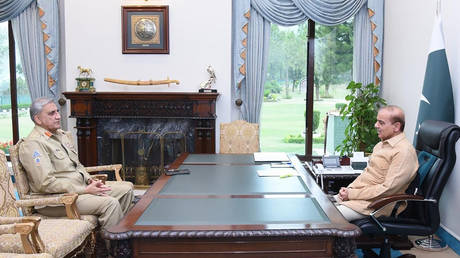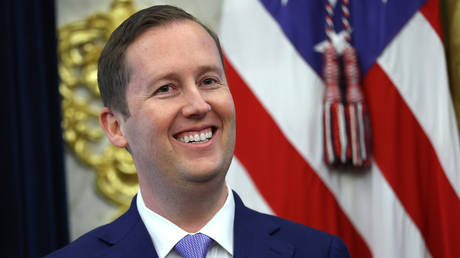
New management takes over after controversial ouster of PM Imran Khan
Acting Pakistani PM Shahbaz Sharif’s new cabinet was sworn in on Tuesday. Acting President Sadiq Sanjrani administered the oath to the 34 ministers, whose portfolios were expected to be announced later in the day.
The formation of the new government comes on the heels of the ouster of former PM Imran Khan, who lost a vote of confidence last Sunday, an event he has blamed on the US for attempting to force “regime change” on Pakistan. The former PM has said his replacement will be an “imported government” answering to a foreign power, presumably the US, and has asked his supporters to take to the streets in protest. He has also called for new elections, claiming the results of the last were tainted.
Premier since 2018, Khan had been fighting to stay in power since March, when his Pakistan Tehreek-e-Insaf party lost its majority in the National Assembly following the loss of seven MPs from its governing coalition partner’s ranks. Khan’s replacement, Sharif, is a member of the leading opposition party, Pakistan Muslim League-Nawaz.
Khan claimed earlier this month to have a letter from a Washington diplomat plainly stating that the US’ anger with Pakistan would “vanish if Imran Khan loses this no-confidence vote,” citing its contents as proof the US was behind his ousting.
However, the US State Department has denied any responsibility. Nevertheless, Khan’s refusal to toe the party line on foreign policy has not pleased Pakistan’s US allies. The former cricket star’s refusal to go along with the West’s punishing sanctions regime against Russia has rankled Washington, to say nothing of his actually meeting with Russian President Vladimir Putin on the day Russia invaded Ukraine in February.
READ MORE: Was the US involved in Pakistani PM’s departure, as he claims?
But Khan has repeatedly stressed that his country is maintaining neutrality rather than jumping in bed with Moscow, declaring “we are not in any [political]camp” during a rally last month and previously accusing a coalition of diplomats from the EU, Canada and Australia of treating Pakistanis like “slaves” when they sent him a letter demanding Islamabad sign on to a UN resolution condemning Russia over its “aggression against Ukraine.”




